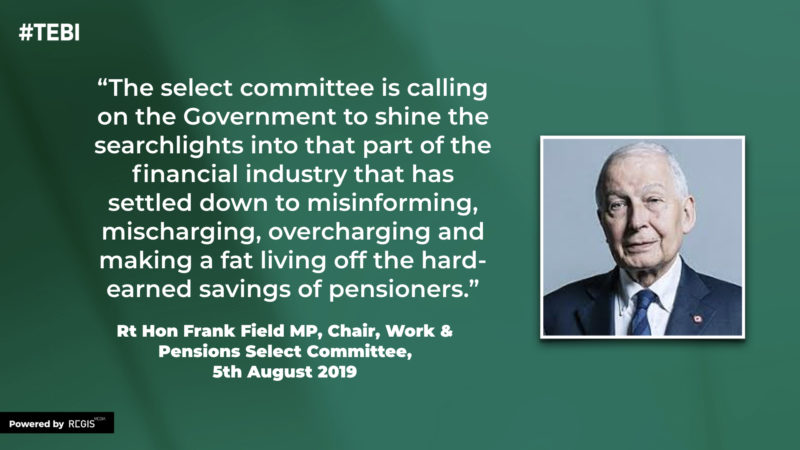
Today was an important moment in the campaign for a fairer, more transparent UK pensions industry.
The House of Commons Work and Pensions Select Committee issued a damning report into pensions, and particularly the lack of transparency around fees and charges. It marks the culmination of an inquiry that has lasted for nine months.
Self-regulation, the report said, has failed. The committee is “unconvinced” that the industry will rise to the challenge of providing clear, transparent information to pension schemes about how much they are paying. It accused the Government of “complacency” on the issue and said it wants Ministers and regulators to take a much firmer line.
Making a fat living
The chair of the committee, Frank Field MP, said this:
“Ripping off pension savers could be eliminated. The select committee is calling on the Government to shine the searchlights into that part of the financial industry that has settled down to misinforming, mischarging, overcharging and making a fat living off the hard-earned savings of pensioners.
“Government and regulators should not wait for the industry to fail to act voluntarily as they have so many times in the past. It must put the full force of the law behind such changes.”
But will the report achieve anything?
None of this will come as any surprise to TEBI readers; we’ve written about these issues many times. Andy Agathaneglou, the founding chair of the Transparency Task Force, for which I’m a volunteer Ambassador, is sceptical as to whether the Select Committee’s report will actually make a difference.
“What is so significant about the committee’s report,” he says, “is that they have set out a long list of changes they wish to see, all of which align very well with what the Transparency Task Force has been campaigning for; so that’s very good news.
“However, the bad news is that whilst in my opinion the changes they are seeking are backed up by compelling rationale and evidence; the harsh reality is that the Work and Pensions Select Committee cannot make the changes we want to happen, happen; they can only ask for them.
“What actually happens now will come down to what the Department for Work and Pensions, the Financial Conduct Authority, HM Treasury and The Pensions Regulator decide to do; and the worst case scenario is they could choose to ignore all of the recommendations.”

What the report says
Defined benefit pension schemes
“The charge cap on default defined contribution pension schemes, introduced in 2015, does not appear to have had the negative impacts some had predicted. But not all charges are covered by the cap and the full extent of charges outside the cap is not known. This makes it impossible to know how well the cap is working in practice. Within the charge cap, pension savers can face wildly different outcomes—some with small dormant pension pots could see their savings completely wiped out through Government-permitted flat fee charging structures.”
The role of trustees and Independent Governance Committees
“We have received worrying evidence that some trustees are making investment decisions without a clear understanding of how much those decisions cost. Proposals to address this through disclosure templates developed by the industry are welcome. However, we are not convinced that there are sufficient incentives to achieve a high take up through voluntary disclosure alone. Industry involvement is important to ensure that policies work in practice — but the overall drive and direction must come from the Government and regulators. The Government and regulators should not wait for the industry to fail to act voluntarily as they have so many times in the past.
“We fully recognise that value for money is not solely about costs, but costs inevitably form an important part of the equation. Complexity and layers of intermediaries mean that many trustees do not have access to suitable information to make judgements about the costs of managing their schemes. Without an agreed definition of value for money it is not possible to make effective comparisons. Schemes should clearly communicate their interpretation of value for money, and how it will be achieved, to their members.
“The Competition and Markets Authority’s Investment Consultants Market Investigation final report, published during the course of this inquiry, has welcome proposals to address conflicts of interest and cosy relationships between schemes and asset managers and to ensure that trustees are actively seeking value for money.”
Pensions dashboard
“A government-backed pensions dashboard will be a welcome, if overdue, additional tool to provide transparency to individuals and help them plan how they use their pension funds. The Government must now take a leading role in the delivery of the project to ensure consumers get the full benefits. We accept that for a pensions dashboard to be launched in a timely manner, it will necessarily be limited at the outset. This should not be at the expense of the launch excluding any key data on an individual’s pension savings, including personal State Pension projections.”
Advice and guidance
“The pension freedoms had two important components: the right to choose and the guarantee of guidance to ensure that the choice is an informed one. Pension Wise has been successful in delivering guidance to its customers, but too few people are using the service. The new Money and Pensions Service will need to outline how it will increase the number of people using Pension Wise.
“We welcome the FCA’s proposals to introduce a set of investment pathways for decumulation products, in line with the recommendation we made in our 2018 report on pension freedoms. These investment pathways must not become a substitute for guidance, which is still required to help individuals determine which product is right for them.
“In our Pensions Freedoms report we also recommended a 0.75% charge cap on these pathways. The FCA told us that it would prefer first to see if market-consistent tools work and then, only if those fail, to introduce a charge cap. This conversation is a near repeat of those our predecessor Committees had with the FCA about schemes used for automatic enrolment savings, which are now the subject of a charge cap. The FCA would send a simpler message to the industry if it just set a charge cap now for investment pathways, rather than issuing vague threats to the industry.
“Many Independent Financial Advisers provide good value for money to their pension customers. However, the number of people paying for good value advice is low. People who are not able to access good advice need guidance and effective protection from pension scams, which can have life changing impacts. Scams not only harm individuals but also cause wider damage to the industry by discouraging potential savers. Scams are not a necessary consequence of the pension freedoms.
“We and our predecessor have twice asked the Government to improve its monitoring and reporting on progress of the pension freedoms and default guidance, yet there remains an absence of a regular authoritative assessment of the policy. We hope for success at the third time of asking.”
You can read the full report here.
For more information about what Andy Agathangelou and the Transparency Task Force are doing to help improve the UK pensions industry, watch this video.









